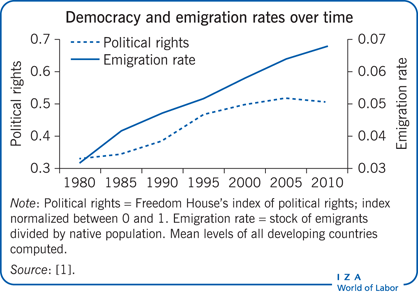Elevator pitch
The number of immigrants from developing countries living in richer, more developed countries has increased substantially during the last decades. At the same time, the quality of institutions in developing countries has also improved. The data thus suggest a close positive correlation between average emigration rates and institutional quality. Recent empirical literature investigates whether international migration can be an important factor for institutional development. Overall, the findings indicate that emigration to institutionally developed countries induces a positive effect on home-country institutions.
Key findings
Pros
International migration to democratic countries can improve political institutions at home.
Positive effects can occur through several channels, e.g. transfer of new ideas and political norms, return or circular emigration, and remittances.
In general, macro studies find positive global effects if migrants’ destination countries are democratic.
Micro studies generally focus on a single country, and find positive effects of some specific channels, such as transfer of norms and return migration.
Cons
International migrants can induce negative effects in the home country if they emigrate to less democratic countries.
Self-selection of migrants, in terms of education or ethnicity, can induce negative effects on institutions, as such individuals tend to be more politically engaged in their home country.
The main channels and specific mechanisms through which emigration affects institutions are not always empirically well-identified.
